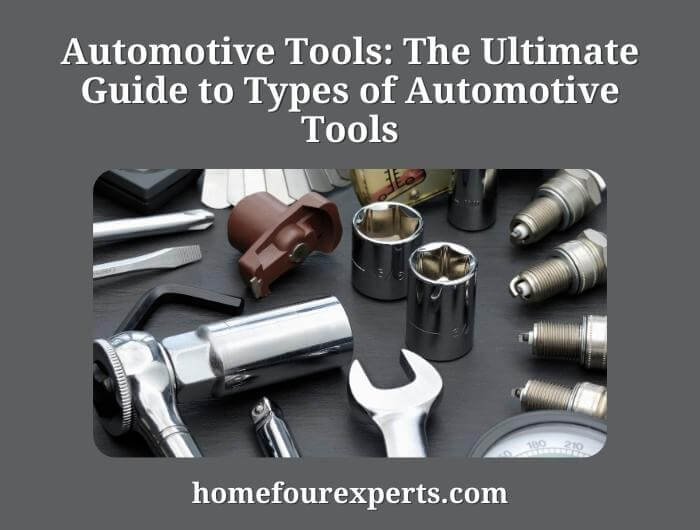Automotive tools are essential for any car owner who wants to keep their vehicle in good condition. Whether it’s for regular maintenance or emergency repairs, having the right tools on hand can save time, money, and hassle. In this guide, we’ll take a look at the different types of automotive tools available and why they’re important to have in your toolkit.

Benefits of owning essential automotive tools:
- Save money on repairs and maintenance;
- Be prepared for emergency situations;
- Maintain your car’s performance and value;
- Increase your knowledge of car mechanics;
Types of Automotive Tools
Hand tools are the most basic and essential tools that every mechanic should have. They are easy to use and versatile, making them ideal for a wide range of tasks. Some of the most common hand tools used in automotive repair include:
Hand Tools
Hand tools are the most basic and essential tools for automotive work. They don’t require any power source and can be used for a variety of tasks. Here are some common hand tools you should have in your toolkit:
Screwdrivers
A screwdriver is used to tighten and loosen screws. There are two main types of screwdrivers: flathead and Phillips. Flathead screwdrivers have a flat tip that fits into the slot of a flathead screw, while Phillips screwdrivers have a cross-shaped tip that fits into the recessed cross-shaped slot of a Phillips screw.
Pliers
Pliers are used for gripping and cutting. There are several types of pliers, including needle-nose pliers, diagonal pliers, and locking pliers. Needle-nose pliers have a long, narrow tip for reaching into tight spaces, while diagonal pliers are used for cutting wire. Locking pliers have a mechanism that locks the jaws in place, making them useful for clamping and holding objects.
Wrenches
Wrenches are used for tightening and loosening bolts. There are several types of wrenches, including open-end wrenches, box wrenches, and adjustable wrenches. Open-end wrenches have two open ends that fit onto the head of a bolt, while box wrenches have a closed end that fits onto the head of a bolt. Adjustable wrenches can be adjusted to fit onto different sizes of bolts.
Hammers
Hammers are used for knocking and hitting objects. There are several types of hammers, including claw hammers, sledgehammers, and ball-peen hammers. Claw hammers are used for driving nails, while sledgehammers are used for heavy demolition work. Ball-peen hammers have a rounded end that is used for shaping metal.
Power Tools
Power tools are designed to make automotive work easier and faster. They require a power source and can handle more demanding tasks. Here are some essential power tools for car maintenance and repair:
Drill/Driver
A drill/driver is used for drilling holes and driving screws. It typically has two-speed settings for drilling and driving, and it can be fitted with various drill bits and driver bits.
Impact Wrench
An impact wrench is used for tightening and loosening bolts. It uses high-torque, rapid-fire impacts to loosen stubborn bolts, making it much faster and easier than using a hand wrench.
Air Compressor
An air compressor is used for powering pneumatic tools. Pneumatic tools, such as air ratchets and air hammers, use compressed air to generate power, making them faster and easier to use than traditional hand tools.
Jumper Cables
Jumper cables are used for jump-starting a car’s battery. They’re essential for anyone who wants to be prepared for a dead battery, and they’re relatively easy to use. Simply connect the cables to the dead battery and the other car’s battery, and the car should start.
Specialty Tools
Specialty tools are designed for specific tasks and are often more specialized than hand or power tools. Here are some special tools you should have in your toolkit:
Engine Analyzer
An engine analyzer is used for testing and analyzing engine performance. It can measure engine RPM, cylinder compression, and other important engine parameters.
Vacuum Gauge
A vacuum gauge is used for measuring vacuum pressure in the engine. It’s especially useful for diagnosing engine problems, such as vacuum leaks.
Feeler Gauge
A feeler gauge is used for measuring the gap between two objects. It’s often used for checking spark plug gaps, valve clearance, and other critical engine measurements.
OBD2 Scanner
An OBD2 scanner is used for reading the diagnostic codes from a vehicle’s onboard computer. It’s a must-have tool for anyone who wants to diagnose engine problems and check for emissions problems.
Considerations when purchasing Automotive Tools
When purchasing automotive tools, it’s important to consider several factors to ensure that you’re getting the right tools for your needs. Some of the key considerations include:

- Quality: The quality of your tools is one of the most important considerations when purchasing automotive tools. High-quality tools are more durable, reliable, and efficient, and they will last longer and perform better than lower-quality tools. When purchasing tools, look for tools that are made from high-quality materials, such as hardened steel or carbon fiber, and that have a good reputation for quality and durability.
- Price: Price is another important consideration when purchasing automotive tools. It’s important to find a good balance between quality and price, as higher-quality tools will often cost more. While it may be tempting to purchase the cheapest tools available, this can often result in tools that are less durable and less efficient, which can lead to increased costs in the long run.
- Purpose: It’s important to consider the purpose of the tools that you are purchasing. Different tools are designed for different tasks, and it’s important to choose the right tool for the job. For example, if you are purchasing a wrench, consider whether you need an adjustable wrench or a box-end wrench, and choose the one that is best suited for your needs.
- Brand: The brand of your tools is also important, as some brands are known for producing high-quality tools, while others are known for producing lower-quality tools. When purchasing tools, consider the reputation of the brand, as well as its customer service and support, to ensure that you are purchasing tools from a reputable and reliable source.
- Warranty: The warranty of your tools is also important, as it provides protection against defects and issues that may arise. When purchasing tools, look for tools that come with a warranty, and consider the length and terms of the warranty to ensure that it provides adequate protection for your needs.
Maintenance of Automotive Tools
Maintaining your automotive tools is essential for keeping them in good working order and ensuring they last as long as possible. Here are some tips for maintaining your tools:
| Cleaning | Regular cleaning of your automotive tools is essential to maintain their performance and prolong their lifespan. Use a clean, dry cloth to remove any dirt or debris that may have accumulated on your tools, and store them in a dry, clean location. |
| Regular Inspection | Regularly inspect your tools for any signs of wear and tear, and replace any damaged tools as soon as possible. This will ensure that your tools are always in good condition and ready for use. |
| Proper Storage | Proper storage of your tools is also important, and it’s important to store them in a dry, clean location to protect them from moisture and dirt. Consider purchasing a toolbox or tool bag to keep your tools organized and protected. |
| Lubrication | Regular lubrication of your tools is also important, as it can help to prevent rust and corrosion, and improve their performance. Use a high-quality lubricant, such as WD-40, to lubricate the moving parts of your tools, and consider using a rust inhibitor to protect them from rust and corrosion. |
| Sharpening | Regular sharpening of cutting tools, such as pliers and screwdrivers, is also important, as it can improve their performance and prolong their lifespan. Use a sharpening stone or a specialized tool sharpener to keep your cutting tools sharp and ready for use. |
By using these simple maintenance tips, you can ensure that your automotive tools are always in good condition and ready for use and that they last longer and perform better over time.
Recommended Maintenance for Automotive Tools
To keep your automotive tools in good working condition and ensure they last as long as possible, it’s important to perform regular maintenance. Here are some recommended maintenance tasks for your tools:
- Clean regularly: Clean your tools after each use to remove any dirt, grease, or oil. Use a cloth or rag to wipe down your tools, and make sure to get into all of the crevices and hard-to-reach areas.
- Store properly: Store your tools in a dry, cool place to prevent rust and other forms of damage. Consider using a toolbox or organizer to keep your tools organized and easily accessible.
- Apply protective oil: Apply a light coat of protective oil, such as WD-40, to your tools to help protect against rust and corrosion. This will also help keep your tools lubricated and moving smoothly.
- Inspect regularly: Regularly inspect your tools for any signs of wear and tear, such as cracks, chips, or bends. Replace any damaged tools to ensure they are in good working order.
- Use properly: Use your tools as they were intended, and avoid using them for tasks that are beyond your capabilities. This can help prevent damage to your tools and ensure they last as long as possible.
- Service and repair: If your tools need repair or maintenance, take them to a professional for service. This will help ensure that your tools are in good working order and will last for many years.
- Organize: Keeping your tools organized will make it easier to find what you need and keep track of what you have. Consider labeling your toolbox or using dividers to separate different types of tools.
By following these recommended maintenance tasks, you can keep your automotive tools in good condition and ensure they are ready when you need them. Regular maintenance will also help extend the life of your tools and save you money in the long run.
Can Radius Gauges also be used as Automotive Tools?
Yes, certain radius gauge types can also be used as automotive tools. These gauges are helpful for measuring the radius of curved surfaces on car bodywork, wheels, and other automotive components. They are essential for ensuring precise and accurate measurements in automotive repair and maintenance tasks.
What Types of Automotive Tools Are Necessary for Maintaining Air Tools?
When it comes to maintaining air tools, having the right automotive tools is crucial. Some necessary tools include air tool lubricant, air tool oil, impact wrenches, and air compressors. Expert advice on oil for air tools can ensure efficient and long-lasting performance of your tools.
Final Verdict
In conclusion, having the right set of automotive tools is crucial for maintaining and fixing your vehicle. From a basic wrench set to a cordless drill, there is a wide range of tools available to suit your needs. When purchasing automotive tools, it’s important to consider factors such as quality, versatility, and ease of use, as well as your specific needs and budget.
Regular maintenance, such as cleaning and lubrication, is also important to ensure that your tools are always in good condition and ready for use. By following the recommended maintenance tips, you can prolong the lifespan of your tools and ensure that they perform at their best.
With the right set of automotive tools, you can tackle a wide range of repairs and maintenance tasks on your own, saving time and money, and giving you the satisfaction of knowing that you can take care of your vehicle yourself. So, whether you’re a seasoned mechanic or just starting out, investing in the right automotive tools is an investment in your vehicle, your skills, and your confidence.
About This Writer

Hello, I am David Rowan. I am a professional contractor with 10 years of experience in home building, different tools used, construction, home remodeling, and other home improvement work. I have already built many custom homes and continued to do several woodworking projects along with how to deal with all categories of tools.